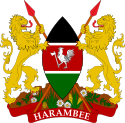- National Alliance Party of Kenya
-
Kenya 
This article is part of the series:
Politics and government of
Kenya
The National Alliance Party of Kenya (NAPK)[1] is a political party in Kenya. The National Alliance Party of Kenya was formed on July 3, 2000 when people from varying background decided to form an alliance of democratic forces to work for the social, economic and political unity and welfare of Kenyan communities.
The leaders of the communities represented at the inaugural meeting subsequently approached Mr. Lawrence Nginyo Kariuki, a prominent businessman and renowned politician to be the founding chairman of the Alliance and Mr. Kariuki consented.
The Alliance has the primary objective of bringing Kenyans together, with the recognition that being united, they stand a better chance of successfully tackling the political, social and economic challenges they face.
In preparation for the 2002 elections, the Democratic Party (DP)together with other 13 small political parties adopted the National Alliance Party of Kenya (then NAK) which had been registered as a political party by a central Kenya businessman Lawrence Nginyo Kariuki. Other members of the NAK were KIjan Wamalwa of Ford Kenya, charity Ngilu of Social Democratic party among others. Few weeks to the 2002 general elections NAK formed a coalition with Liberal Democratic Party (LDP) to form the National Rainbow Coalition (NARC) umbrella coalition party. On 27 December 2002, the last legislative elections, NARC won 56.1 % of the popular vote and 125 out of 212 elected seats. NAK itself took 66 of these seats. At the presidential elections of the same day, NARC supported Mwai Kibaki, who won 62.2 % of the vote and was elected the third president of Kenya.
On September 13, 2007 NAk joined Mwai Kibaki and other political parties in the formmation of the Party of National Unity (PNU). PNU fared poorly in the parliamentary elections 2007 reaching only 43 seats against nearly 99 for its main rival, the Orange Democratic Movement (ODM). Together with affiliated parties, however, it could command around 78 members of parliament.
On February 28, 2008 through a mediation team headed by former UN General Secretary Kofi Annan, the PNU government reached a deal with the ODM to share power. ODM is headed by Raila Odinga. The power sharing deal was the first one of its kind in Africa.
The national Alliance party of Kenya was re-registered again in the year 2008 under the new political parties act 2007 as an independent party from its previous mother PNU. Now under the leadership of the former chairman Nginyo Kariuki. The Party also changed its initials from NAK to NAPK with the slogan "chui" from the party symbol, a leopard.
the Party was revivived in January 2010 with an aim to benefit from the continued political fallout in ODM and PNU.[2]
References
Categories:- Political parties in Kenya
Wikimedia Foundation. 2010.
